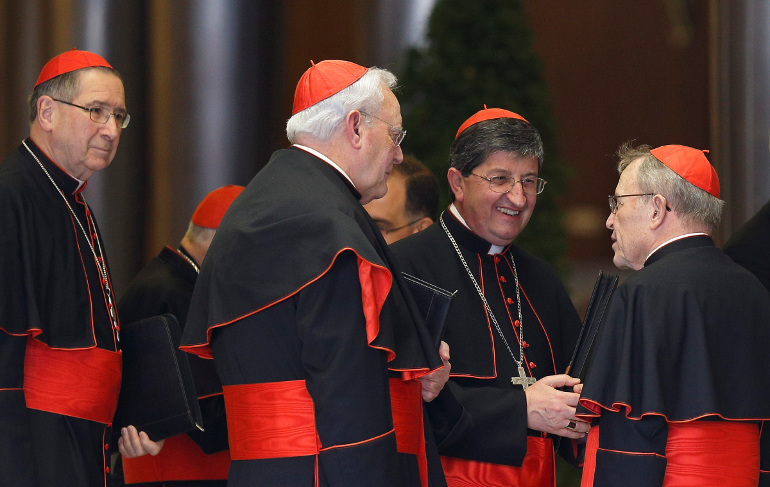
German Cardinal Walter Kasper, right, speaks with cardinals as they arrive for the afternoon session of a meeting with Pope Francis in the synod hall at the Vatican Feb. 21. Also pictured are Cardinals Roger M. Mahony, retired archbishop of Los Angeles, left, Carlos Amigo Vallejo, retired archbishop of Seville, Spain, and Giuseppe Betori of Florence. (CNS/Paul Haring)
The Catholic church needs to find a way to offer healing, strength and salvation to Catholics whose marriages have failed, who are committed to making a new union work and who long to do so within the church and with the grace of Communion, Cardinal Walter Kasper told the world's cardinals.
Jesus' teaching on the indissolubility of sacramental marriage is clear, the retired German cardinal said, and it would harm individuals and the church to pretend otherwise. However, "after the shipwreck of sin, the shipwrecked person should not have a second boat at his or her disposal, but rather a life raft" in the form of the sacrament of Communion, he said.
Pope Francis had asked Kasper, a well-known theologian and author of a book on mercy as a fundamental trait of God, to introduce a Feb. 20-21 discussion by the College of Cardinals on family life. The Vatican did not publish the cardinal's text, but Catholic News Service obtained a copy.
The Catholic church needs to find a way to help divorced and remarried Catholics who long to participate fully in the life of the church, Kasper told the cardinals. While insisting -- for the good of individuals and of the church -- on the need to affirm Jesus' teaching that sacramental marriage is indissoluble, he allowed for the possibility that in very specific cases the church could tolerate, though not accept, a second union.
From the first moments of creation, the cardinal said, God intended man and woman to be together, to form one flesh, to have children and to serve him together. But sin entered the world almost immediately, which is why even the Bible is filled with stories of husbands and wives hurting and betraying one another, he explained.
Christ, who came to set people free from the bonds of sin, established marriage as a sacrament, "an instrument of healing for the consequences of sin and an instrument of sanctifying grace," he said.
Because they are human and prone to sin, husbands and wives continually must follow a path of conversion, renewal and maturation, asking forgiveness and renewing their commitment to one another, Kasper said. But the church also must be realistic and acknowledge "the complex and thorny problem" posed by Catholics whose marriages have failed, but who find support, family stability and happiness in a new relationship, he continued.
"One cannot propose a solution different from or contrary to the words of Jesus," the cardinal said. "The indissolubility of a sacramental marriage and the impossibility of a new marriage while the other partner is still alive is part of the binding tradition of the faith of the church and cannot be abandoned or dissolved by appealing to a superficial understanding of mercy at a discount price."
At the same time, "there is no human situation absolutely without hope or solution," he said Catholics profess their belief in the forgiveness of sins in the Creed, he explained. "That means that for one who converts, forgiveness is possible. If that's true for a murderer, it is also true for an adulterer."
Kasper said it would be up to members of the extraordinary Synod of Bishops on the family in October and the world Synod of Bishops in 2015 to discuss concrete proposals for helping divorced and civilly remarried Catholics participate more fully in the life of the church.
A possible avenue for finding those proposals, he said, would be to develop "pastoral and spiritual procedures" for helping couples convinced in conscience that their first union was never a valid marriage. The decision cannot be left only to the couple, he said, because marriage has a public character, but that does not mean that a juridical solution -- an annulment granted by a marriage tribunal -- is the only way to handle the case.
As a diocesan bishop in Germany in 1993, Kasper and two other bishops issued pastoral instructions to help priests minister to such couples. The Congregation for the Doctrine of the Faith, headed by the then-Cardinal Joseph Ratzinger, made the bishops drop the plan. A similar proposal made last year by the Archdiocese of Freiburg, Germany, was criticized by Cardinal Gerhard Muller, current prefect of the doctrinal congregation.
Citing a 1972 article by then-Fr. Joseph Ratzinger, Kasper said the church also might consider some form of "canonical penitential practice" -- a "path beyond strictness and leniency" -- that would adapt the gradual process for the reintegration of sinners into full communion with the church used in the first centuries of Christianity.
To avoid the greater evil of offering no help to the divorced and remarried, cutting them and most likely their children off from the sacraments, he said, the church could "tolerate that which is impossible to accept" -- a second union.
"A pastoral approach of tolerance, clemency and indulgence," he said, would affirm that "the sacraments are not a prize for those who behave well or for an elite, excluding those who are most in need."



